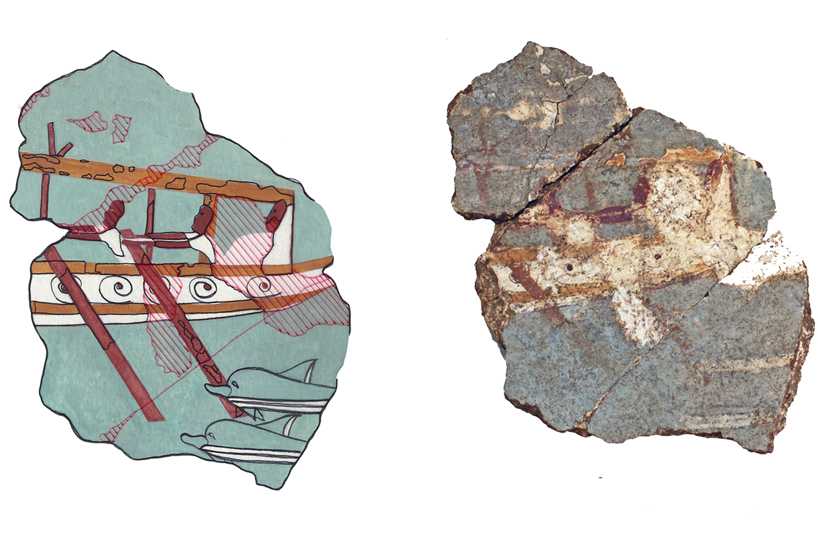
UMSL archaeologist Michael Cosmopoulos and his team of students, staff and specialists found a fragment (right) of an ancient Greek wall painting at a site in Iklaina, Greece. The image to the left is an artist rendering of how the fragment may have originally appeared.
An ancient Greek artifact excavated by University of Missouri–St. Louis archaeologist Michael Cosmopoulos will be part of an exhibition opening in January at the Centre for Fine Arts in Brussels, Belgium, often referred to as BOZAR.
The fragment of wall painting, part of a larger wall fresco, was unearthed in stages from 2010 to 2011 at a site in Iklaina, Greece, where for the past 15 years Cosmopoulos has led a team of students, staff and specialists. The fragments were spread among the ruins of a destroyed palace that dates from sometime between 1400 B.C. and 1300 B.C., which was during the Bronze Age.
The fragment is an irregularly shaped piece, approximately 5 inches by 6 inches. It is part of a larger composition that shows a maritime representation – a ship with its oarsmen and dolphins. Its importance is that this is the earliest naval representation from the Greek Mainland.
The exhibition, titled “Nautilus: Navigating Greece,” will combine unique works of art from ancient and contemporary Greece. It examines the intimate relationship between the Greeks and the Mediterranean Sea trough the ages, and will run from Jan. 27 through April 27. On display will be nearly 100 ancient artifacts, including bronze and marble sculptures, frescoes, coins, vases and ceramic vessels, from more than 30 Greek museums. The display was organized in cooperation with the Hellenic Ministry of Foreign Affairs and the Ministry of Culture and Sports.
Cosmopoulos said the wall fragment was found on the very last day of the 2010 excavation season.
“Everyone on the dig was so excited and amazed at the discovery of such an intricate fresco – it was totally unexpected,” he said. “There it was, a window into the Bronze Age past of a prehistoric people long gone.”
Upon his team’s return in 2011 additional pieces were found in the ruins of the building. And he said there may even be more that have yet to be discovered.
This will be the first time the artifact will be exhibited outside of Greece. Since, the fragments discovery it’s been in storage at a local museum in the Greek city of Pylos.
The excavations at Iklaina have also brought to light massive walls, formal buildings and the oldest-known written tablet in Europe, which is also the oldest-known state bureaucratic record.
The exhibition was organized to highlight Greece’s upcoming six-month turn as president of the European Union. The nation took the helm Jan. 1, 2014. In addition, Greece will issue a commemorative stamp depicting the wall painting.














